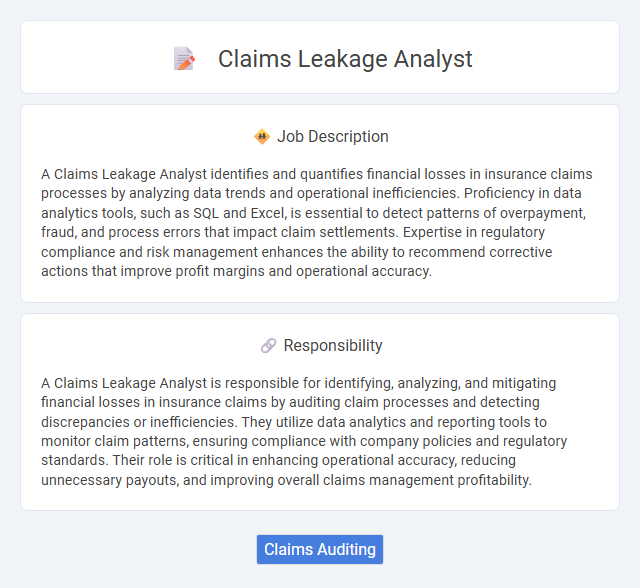
A Claims Leakage Analyst identifies and quantifies financial losses in insurance claims processes by analyzing data trends and operational inefficiencies. Proficiency in data analytics tools, such as SQL and Excel, is essential to detect patterns of overpayment, fraud, and process errors that impact claim settlements. Expertise in regulatory compliance and risk management enhances the ability to recommend corrective actions that improve profit margins and operational accuracy.
Individuals with strong analytical skills and attention to detail are likely to excel as Claims Leakage Analysts, as the role involves identifying discrepancies and preventing financial loss. Those comfortable working with complex data and regulatory frameworks may find this position suitable due to the requirement for meticulous examination of claims and compliance issues. Candidates who prefer structured problem-solving and can maintain accuracy under pressure will probably perform well in this job.
Qualification
A Claims Leakage Analyst requires strong analytical skills, proficiency in data analysis tools such as SQL, Excel, and BI software, and a solid understanding of insurance claims processes. Candidates should have experience in identifying patterns of claims leakage, performing root cause analysis, and recommending cost-saving strategies to minimize financial losses. A background in insurance, finance, or statistics, combined with excellent attention to detail and communication skills, is essential for success in this role.
Responsibility
A Claims Leakage Analyst is responsible for identifying, analyzing, and mitigating financial losses in insurance claims by auditing claim processes and detecting discrepancies or inefficiencies. They utilize data analytics and reporting tools to monitor claim patterns, ensuring compliance with company policies and regulatory standards. Their role is critical in enhancing operational accuracy, reducing unnecessary payouts, and improving overall claims management profitability.
Benefit
Claims Leakage Analyst roles likely offer significant benefits by identifying errors and inefficiencies in claim processing, which can lead to substantial cost savings for organizations. The position may enhance financial accuracy and optimize claims management, increasing overall operational efficiency. Professionals in this role probably gain valuable insights into risk mitigation and strategic decision-making within the insurance sector.
Challenge
Claims Leakage Analysts likely face the challenge of accurately identifying insurance claim errors that cause financial losses. The complexity of large data sets and evolving fraud techniques may increase the difficulty of detecting subtle discrepancies. Adapting quickly to regulatory changes and ensuring thorough investigations could also be significant hurdles in this role.
Career Advancement
Claims Leakage Analysts play a crucial role in identifying discrepancies and inefficiencies within insurance claims processing to minimize financial losses. Mastery of data analytics tools and deep knowledge of claims management processes pave the way for advancement into senior risk management or claims auditing positions. Developing expertise in predictive modeling and regulatory compliance enhances opportunities for leadership roles within insurance firms.
Key Terms
Claims Auditing
Claims Leakage Analysts specialize in identifying discrepancies and inefficiencies within insurance claims through detailed claims auditing processes that ensure accurate payments and compliance. They utilize data analytics and auditing software to detect patterns of leakage, facilitating reduction in financial losses and improvement in operational accuracy. Expertise in regulatory standards and thorough report generation supports strategic decision-making in claims management.
 kuljobs.com
kuljobs.com